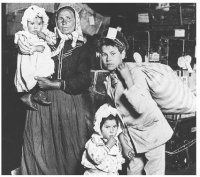From The Peopling of New York City
The Italians had a male-dominated family society. The men were supposed to earn while the women were supposed to be housewives and take care of the children and the family. However, hard economic times made women of the earlier generation find work in sweatshops and garment industries. Young girls were taught to clean and cook and take care of the younger siblings from an early age, however were encouraged to earn money as well. [1] Education among these peasant-turned low paying workers had little importance. They were distrustful of the public school system that they thought would corrupt their children and draw them away from the family. The families that did send their children to school were more likely to send the boys rather than the girls. However, hardships by faced the families forced most of these school-going children to drop out at an early age to join the workforce. [2] Family relations also influenced migration patterns and most Italians preferred to live surrounded by people they have known from their native land. However, as an English-speaking new generation of Italians Americans began to grow, family bonds clashed with the desire to venture out of the safety net. Over time, the strong family bonds gave way to the American way of life. [3]
Citations
- ↑ Binder, Frederick, and David Reimers. All the Nations Under Heaven(142). New York: Columbia University Press, 1995.
- ↑ Binder, Frederick, and David Reimers. All the Nations Under Heaven(141). New York: Columbia University Press, 1995.
- ↑ ITALIAN AMERICANS. 2008. May 2009. [1]
